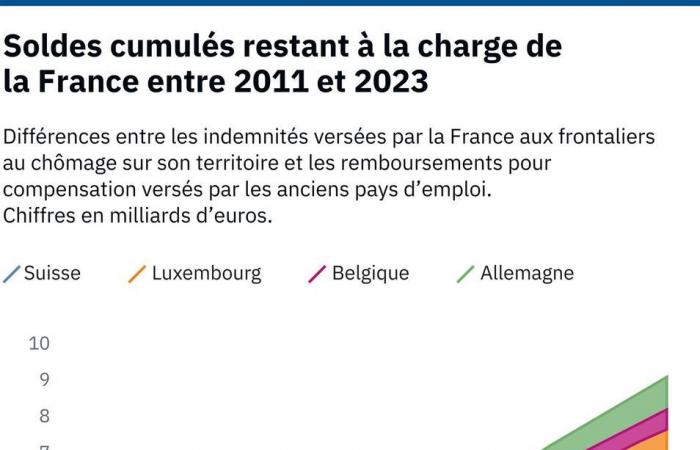Franco-Swiss region –
Unemployment insurance: cross-border workers will know their fate this week
Negotiations between social partners to find significant savings for Unédic must end on Thursday or Friday. The amount of cross-border workers’ allowance is at stake.
Published today at 05:00
In the event of loss of employment in Switzerland, cross-border workers in France could lose a substantial part of their unemployment benefit if the idea of applying a reducing coefficient to them was validated.
AFP
Subscribe now and enjoy the audio playback feature.
BotTalk
- France, in a critical financial situation, must drastically reduce its spending.
- The government is asking employers and unions to find significant savings on unemployment insurance.
- One of the ways to save money is to reduce the amount of costly benefits for cross-border workers in the event of job loss.
- Swiss unions are getting involved in support of cross-border workers.
This weekend will be crucial for cross-border workers residing in France and working in countries bordering France, including Switzerland. The future of their unemployment insurance is currently under discussion between the social partners.
The more than 445,000 cross-border workers in France (all neighboring employment countries combined, in 2020, latest figures available) are directly affected. Among them, nearly 231,500 work in Switzerlanddont more than 112,000 in the canton of Geneva et nearly 44,700 in the canton of Vaud (statistics as of third quarter of 2024).
The situation is unfavorable for cross-border workers. France finds itself in a perilous financial situation: the public deficit is widening and the debt is increasing. The State must drastically reduce its spending.
400 million savings
At the request of the Barnier government, employers and unions have opened negotiations to find savings avenues for unemployment insurance. The Ministry of Labor is asking them to find 400,000 million euros in additional savings per year from 2025 (compared to the agreement concluded in November 2023).
Negotiations have already started. They must end tomorrow, Thursday, or Friday at the latest. The new unemployment insurance agreement must replace the current compensation rules from January 1, 2025.
During the penultimate round of negotiations, last Friday, the entertainment workers were removed from the scope of the discussions. Initially, the employers wanted to tighten the conditions of affiliation for this category of workers. The project sparked an outcry among those involved and their unions. The employer representatives then immediately withdrew their proposal during the meeting.
Cross-border workers targeted
Seniors, but also cross-border workers, are now in the crosshairs. The latter weigh heavily in the coffers of theUnédic. And for good reason.
According to the European rules in this areaEuropean cross-border workers contribute in the country in which they work. But in the event of job loss, it is their country of residence that pays their unemployment benefits.
A financial compensation system exists between States. This provides that the former country of employment pays between three and five months of unemployment benefits to the country of residence. But the amounts received by the second may be insufficient depending on the circumstances. This is the case in France for Unédic.
Very expensive unemployed
The number of unemployed cross-border workers in France is increasing. Their compensation period is longer than that of other beneficiaries. And the amount of their allowances is also higher, this being calculated on the basis of their last salaries received abroad, generally higher than in France, typically for those who worked in Switzerland for example. These unemployed people are therefore very expensive for Unédic.
In a recent reportthe association responsible for managing unemployment insurance calculates that in 2023, it has paid 1 billion euros in compensation to the 77,000 unemployed cross-border workers previously active in the four main neighboring employment countries which are Switzerland, Germany, Luxembourg and Belgium. But she only received 200 million euros in reimbursement from these.

Results: the additional cost reaches 803 million euros in 2023. Cumulatively between 2011 and 2023, the deficit amounts to 9 billion euros (see above).
The spectrum of a coefficient
For France, two options present themselves. The first consists of renegotiating current European regulations in this area with other States. The objective would be to obtain from the countries of employment of cross-border workers that they increase the duration, and therefore the amounts, of unemployment benefits that they pay to the countries of residence, in this case France.
Problem: this risks being long, complicated and, above all, random. It is difficult to see the countries of employment agreeing to put more of their hand into their wallets, as the sums at stake could be so large for them.
Second option: an internal Franco-French solution, which has the advantage of not having to convince European partners, consists of modifying the calculation of the amount of unemployment benefits for cross-border workers only.
Unions divided
The employers therefore propose to apply a reducing coefficient to take into account the difference in standard of living between the country of employment of the unemployed cross-border worker and France. The idea has already been suggested by some economists.
The proposal is not accepted by all workers’ unions. They are in fact divided among themselves on the question.
The CFE-CGC executives union, which recognizes the problem posed by the particular weight of cross-border workers, accepts the principle of a coefficient.
Pragmatic, the French Democratic Confederation of Labor (CFDT) considers that making savings on compensation for cross-border workers is “the least worst response” to the government’s desire to find savings.
Unia and SGB USS involved
Conversely, the General Confederation of Labor (CGT), in a joint press release with the Luxembourgish OGBL and Swiss unions Unia and SGB USSopposes “the reduction in rights” of cross-border workers who “have contributed or paid taxes”. She believes that it is not up to these workers to pay for the insufficient compensation of Unédic by Switzerland, in particular. The centers calculate that with a coefficient system, “the average daily allowance could drop by 48% for a person who has worked in Switzerland”, for example.
Force Ouvrière (FO) also says no to the coefficient. She argues for “republican equality” between citizens.
As for the French Confederation of Christian Workers (CFTC), it fears the opening of a Pandora’s box. She asks that such a measure, if adopted, only have an “exceptional character”.
The last round of negotiations between social partners takes place this Thursday.
“Jump-Border”
News, good advice and ideas for outings. With “Saute-Frontière”, find every week everything you need to live well in Greater Geneva.
Other newsletters
Log in
Fabrice Breithaupt is a journalist and editorial secretary. He deals with Franco-Swiss cross-border issues, but also real estate, employment and training. He has been a PR journalist since 1995 (radio, then written press).More info
Did you find an error? Please report it to us.
1 comment








